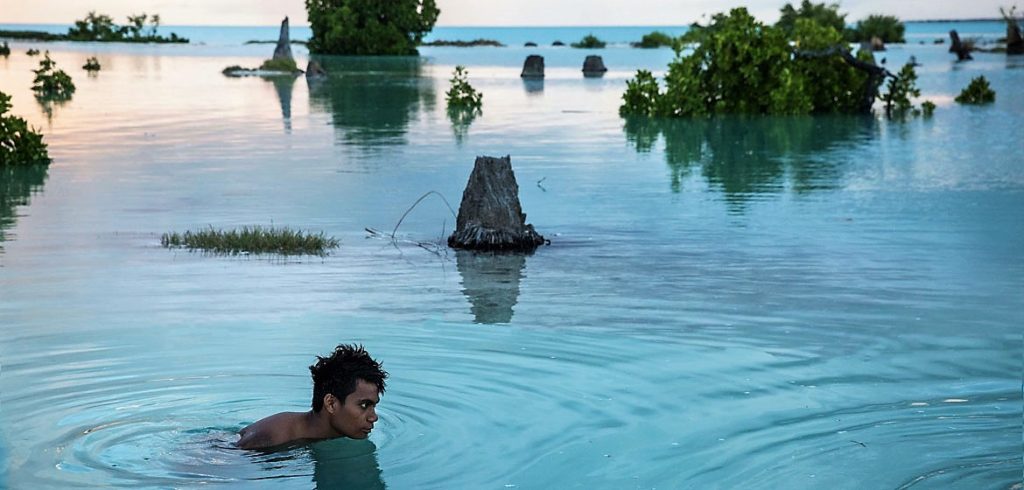Central Europe is currently experiencing a real heatwave and every day passing the 30-degree mark. Who wouldn’t want to visit the beach to relax and forget about the exhausting heat in the big cities?. Unfortunately, due to travel restrictions for Coronavirus reasons, many of the dream vacation destinations seem more abstract than real.
Now, speaking about wonderful destinations, I would especially like to refer to a fantastic place located in the South Seas, that may soon no longer exist: Kiribati.
Kiribati is an island state in the Pacific Ocean, whose territory extends over a large number of islands in Micronesia and Polynesia. The approximately 110,000 inhabitants of Kiribati live on 32 narrow atolls distributed over a 5 million square kilometer water surface, which is larger than the European Union, but only two percent of it is land. Except for the almost uninhabited volcanic island of Banaba, the country’s highest point of three meters above sea level is on the main island of Tarawa.
Kiribati’s big problem is that its sea level is rising by more than three millimeters a year as a result of climate change. But this is causing more problems than just the loss of land. Besides the increasingly frequent flooding, the so-called king tides; it is dying plants and trees, coastal erosion, and the diminishing number of freshwater springs that are making life difficult for the inhabitants of Kiribati. More and more people are settling into the capital South Tarawa, which with 60,000 inhabitants has a similar settlement density to Tokyo, with hardly any infrastructure.
Climate change as a reason for asylum
The case of a man named Kiribati Ioane Teitiota, who moved to New Zealand in 2007 and was to be deported to his homeland in 2013, after his visa expired, caused a worldwide sensation. Due to the effects of climate change on his home country, Teitiota applied for asylum in New Zealand for himself and his family. His application was rejected because according to the Geneva Refugee Convention he can only claim protection against “persecution”. Asylum is only granted if this persecution is discriminatory, i.e. directed against certain political, religious, or social groups. There is no asylum for “water reasons”, because climate change affects everyone, whether rich or poor.
That is when an interesting approach arises, it is understood that the poor are the most vulnerable in front of the misfortunes of nature. However, humans are the great makers of much of what happens in our environment today. Therefore, the international community, especially the industrialized nations, should take more seriously the responsibility for the growing consumption of resources and the consequences that result from it. The refugee Teitiota saw it in the same way and decided to take legal action. But the Refugee Convention, which came into force after the Second World War, in no way covers cases like Teitiota’s. For this reason, the possibility of an amendment or implementation of new regulations to include people fleeing from climate disasters is an urgent pending matter for lawmakers.
Teitiota failed in further instances until in January of this year a decision was made which can be classified as historic. Following an official complaint by Teitiota, the UN Human Rights Committee dealt with the matter and described the consequences of climate change as a possible reason for asylum. The 116 states worldwide, which have committed themselves to recognize the decisions of the UN Human Rights Committee, can currently only guess at what a possible new wave of refugees will be coming in the future. Besides the 110,000 inhabitants of Kiribati, other countries are struggling massively with the consequences of climate change.
What’s next, Kiribati?
Teitiota’s direct complaint was rejected by the UN Human Rights Committee, saying that Kiribati had sufficient protection mechanisms for the population and that there was still enough time to take further measures. However, this is extremely difficult for the economically weak island state, which gained independence from the British Kingdom in 1979. The two main sources of income are the granting of fishing rights to countries such as Korea or Japan and interest from a fund set up by the British to compensate for the complete depletion of all phosphate resources.
Most of all, Kiribati is dependent on the help of the industrialized countries and their influence on climate change. Tirelessly, Kiribati delegations at international congresses, such as the World Climate Summit, point out the precarious situation of the island archipelago. Especially President Anote Tong, who ruled from 2003 to 2016, was extremely active in this regard. Under his government, the diplomatic discourse with the big oceanic neighbors was intensified and an important decision for the future of Kiribati was taken.
In 2012, Kiribati bought an area of 24 square kilometers on the island of Vanua Levu, the second biggest island of Fiji, for 8.8 million US dollars. This island, which is about 2,000 kilometers away, is intended to become the destination for the resettlement of the entire population in the worst case. In general, it is unimaginable for most of the inhabitants of Kiribati to have to leave their homeland, especially for the older generation. But if they have to flee one day, a splitting into Australia, New Zealand, or Fiji is not really in the interest of the population. Kiribati may sink, but with it, its culture, its way of life, its dances, and songs should not do the same. The “I-Kiribati”, as the inhabitants call themselves, want to migrate together and with dignity.
So Kiribati is already preparing for the worst-case scenario, which they alone are not able to prevent. An entire country that loses its homeland is terrible and unimaginable to me. Undoubtedly, only nations working in unity, can prevent the downfall of Kiribati.
It’s time not to be indifferent. How many more nations have to lose their homes before we finally wake up?
